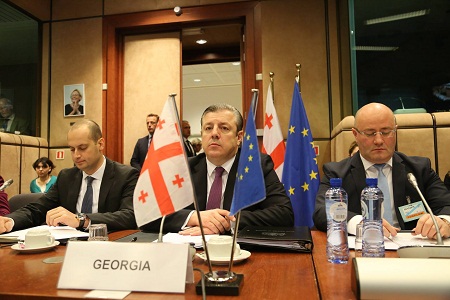Georgia-EU Association Council stresses importance of ‘prompt’ visa liberalisation

The European Union (EU) and Georgia held the third Association Council meeting this afternoon; the first such meeting since the Georgia-EU Association Agreement came into full force earlier this year.
The meeting discussed all angles of Georgia-EU relations including prospects for Georgians to travel without a visa to the EU’s Schengen Zone.
The Association Council stressed the importance of "prompt finalisation of the decision-making process” required to exempt Georgian citizens, with biometric passports, from visa requirement within the Schengen area.
EU High Representative for Foreign Affairs and Security Policy Federica Mogherini, chaired today's meeting and said it was in the best interests of both the EU and Georgia for the country to be granted visa liberalisation.

This was the first Council meeting since the Georgia-EU Association Agreement came into full force earlier this year. Photo by the Prime Minister's press office.
Mogherini refrained from naming dates but said she believed the process would end positively for Georgia as soon as a decision on the Suspension Mechanism was achieved within the EU.
What is the EU-Georgia Association Council?
The Council is the highest formal body established under the EU-Georgia Association Agreement to supervise Georgia's implementation of the deal, and to discuss issues of mutual interest.
It was the third meeting Council meeting but the first since the AA came into full force on July 1, 2016, which marked the start of the deal's full-scale implementation.
Assessment of Georgian elections
The Association Council praised the way Georgia held its recent election, and welcomed the fact that the October Parliamentary Elections "were competitive, well-administered and fundamental freedoms were generally respected”, as said in the OSCE/ODIHR preliminary report.
The Association Council agreed the strong parliamentary majority had a responsibility to strengthen democratic institutions, consolidate a pluralistic democracy in Georgia and advance reforms.
Initial benefits of the DCFTA
The Council welcomed the primary benefits of economic integration through the Deep and Comprehensive Free Trade Agreement (DCFTA) implementation.
I want to reaffirm that #Georgia continues to be a reliable #security partner to the EU, committed to address common challenges #EUGeorgia
— Giorgi Kvirikashvili (@KvirikashviliGi) December 2, 2016
The Association Council also noted the positive trends in bilateral trade since the provisional application of the DCFTA.
Both sides highlighted the importance of creating more "success stories” in terms of new market openings for Georgian products, as well as the need to better communicate the advantages of the DCFTA to attract Foreign Direct Investments (FDIs).
Georgia praised for its democratic reforms
The progress made by Georgia through the implementation of "comprehensive reforms” in the justice sector was another thing the Association Council spoke highly about.
Both sides agreed on the need for Georgia to consolidate and continue the current path of progress. The EU underlined its commitment to continue assisting Georgia as it worked to reform the judiciary and safeguard the rule of law.
The Association Council outlined the "solid EU assistance” provided to Georgia in recent years. This support was legislative and financial, which had particularly increased in the period 2014-2017 with an annual average of €100 million available to support the ambitious political, judicial and economic reforms envisaged in the Association Agreement and the Association Agenda.

The Association Council meeting was chaired by Federica Mogherini (C). Photo by the Prime Minister's press office.
The EU body expressed readiness to assist Georgia's increased participation in EU programs in order to bring tangible results to the Georgian population.
Territorial problems
The EU reiterated its firm support for the territorial integrity of Georgia within its internationally recognised borders, as well as its firm commitment to peace, stability and conflict resolution in Georgia.
From our end the EU is committed to using all instruments at its disposal through a comprehensive approach including its policy of non-recognition and engagement in Georgia,” stated an official EU press release.
The meeting stressed a "deep concern” about a military deal between Russia and Georgia's de facto Abkhazia region, stating all deals between Russia and Georgia’s occupied regions Abkhazia and Tskhinvali (South Ossetia) were illegal.
The Association Council called on Russia to fulfill its obligations under the August 12, 2008 Ceasefire Agreement and its subsequent implementing measures of September 8 2008, and to provide the European Union Monitoring Mission access to the two Georgian regions, which are currently occupied by Russia.
 Tweet
Tweet  Share
Share